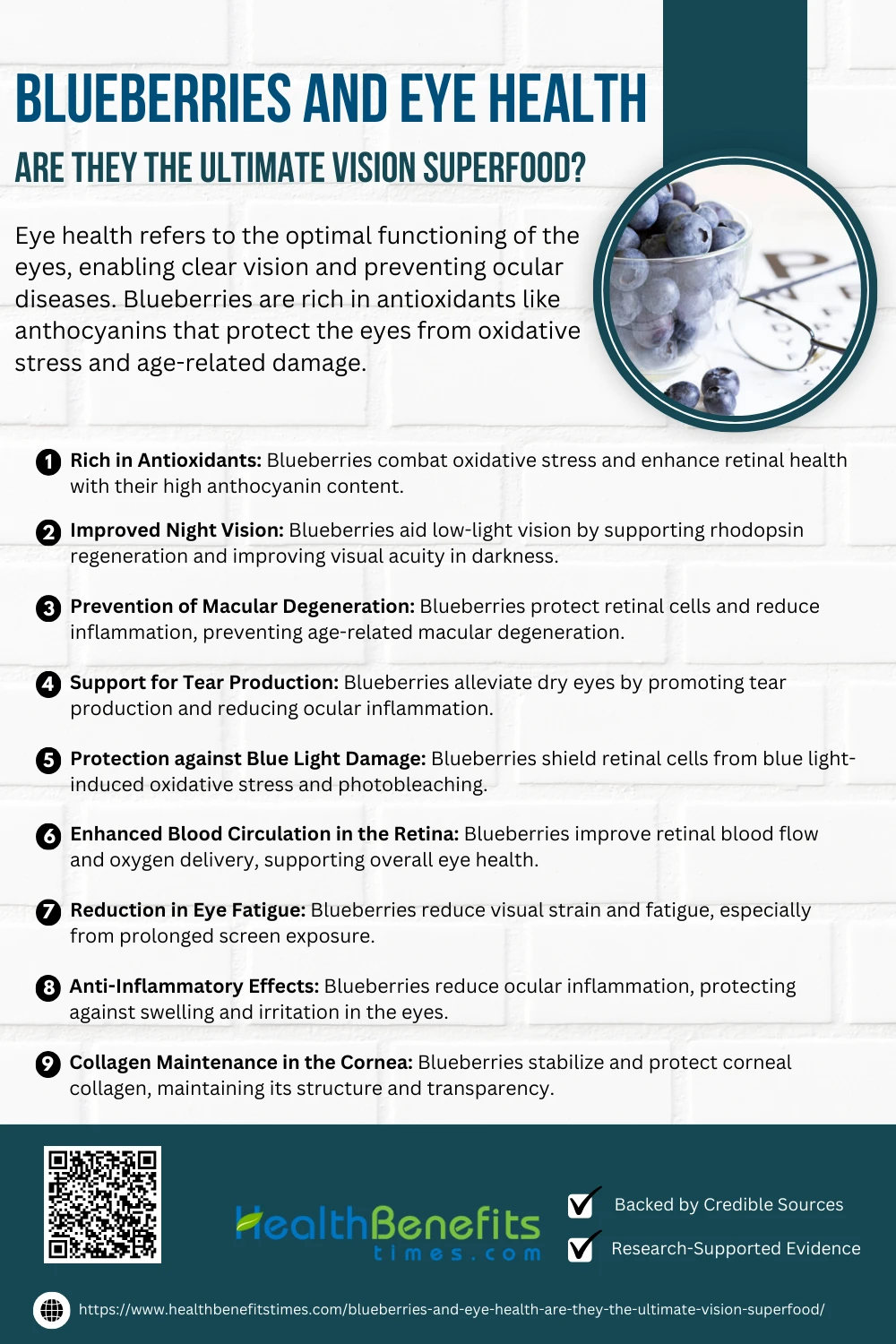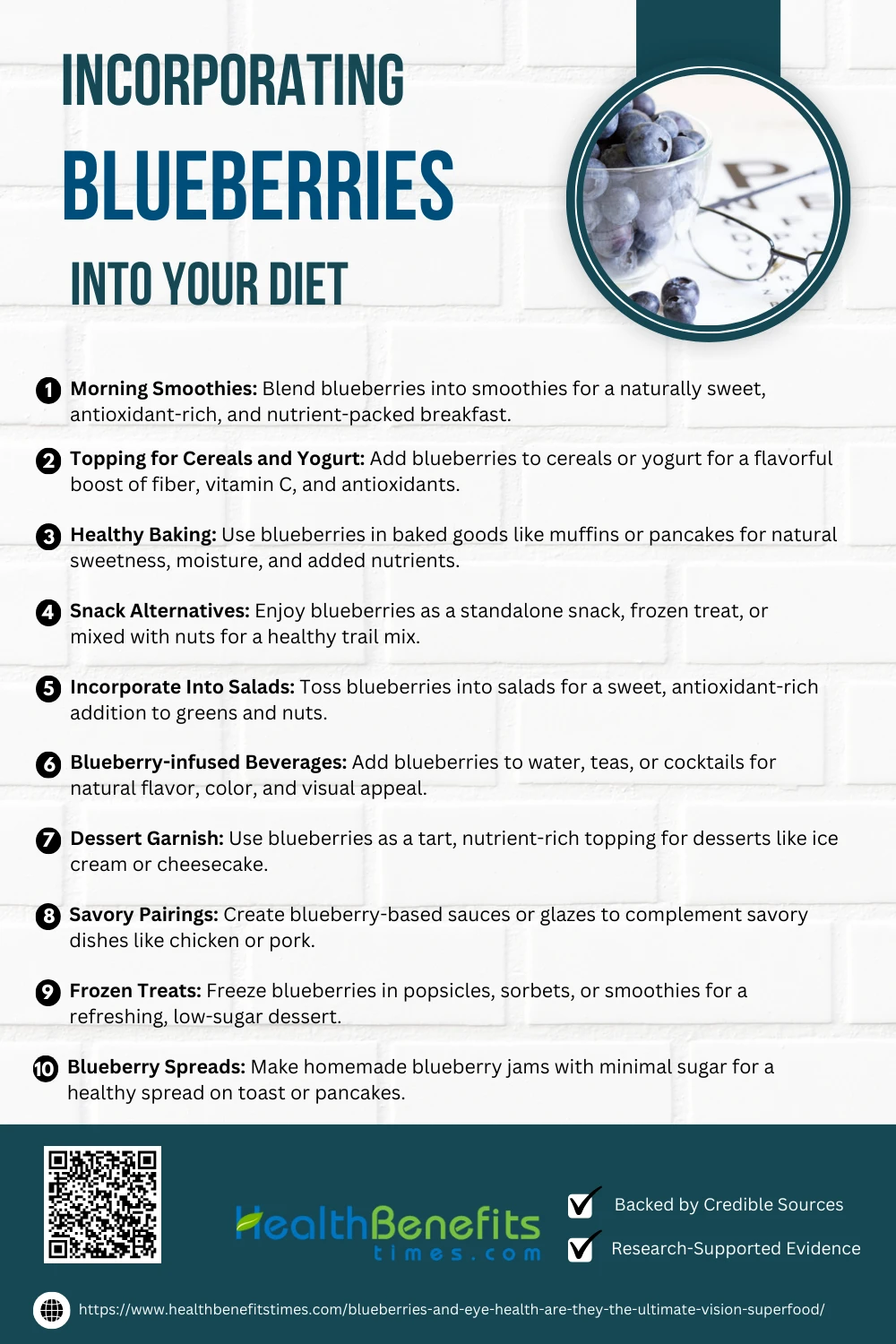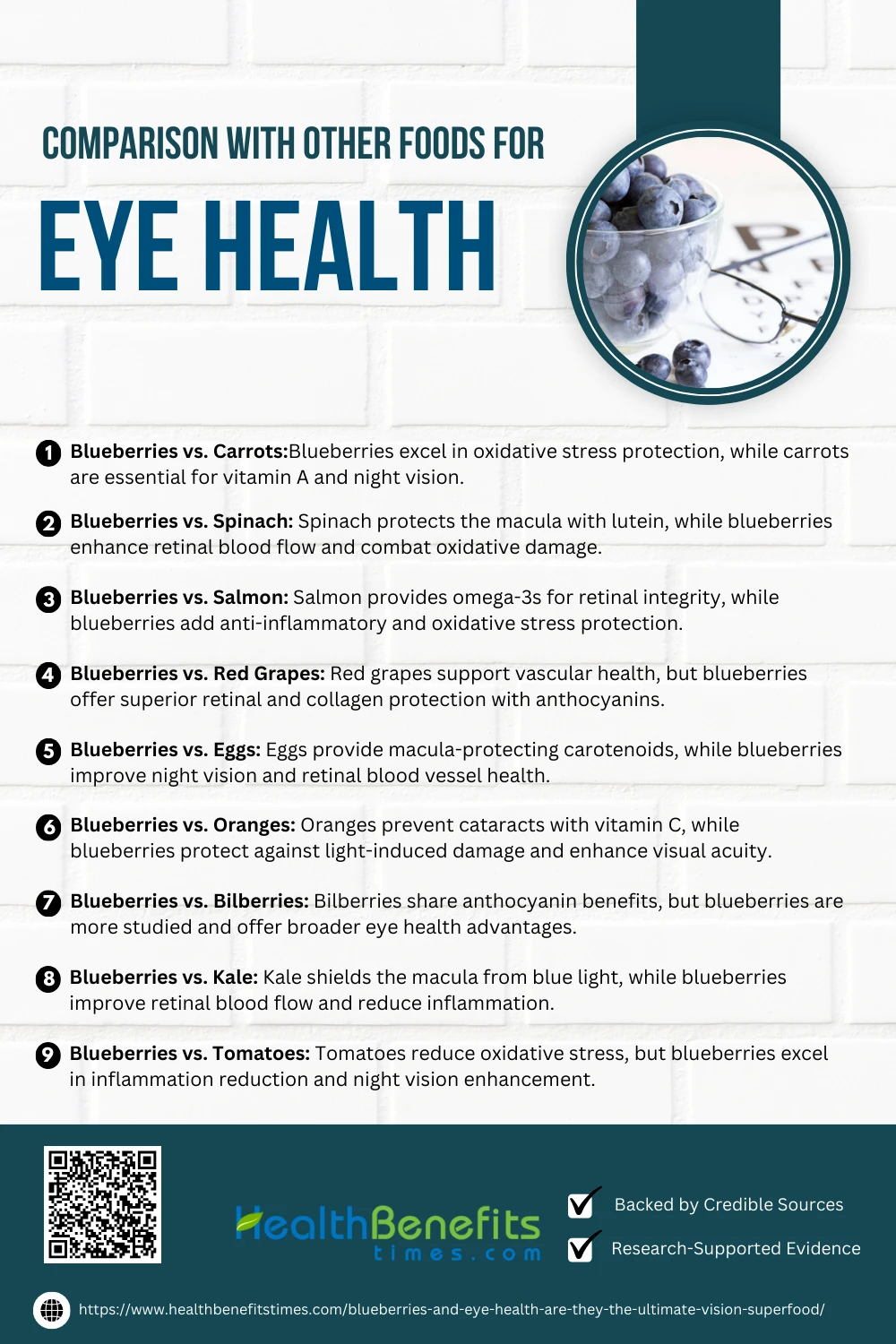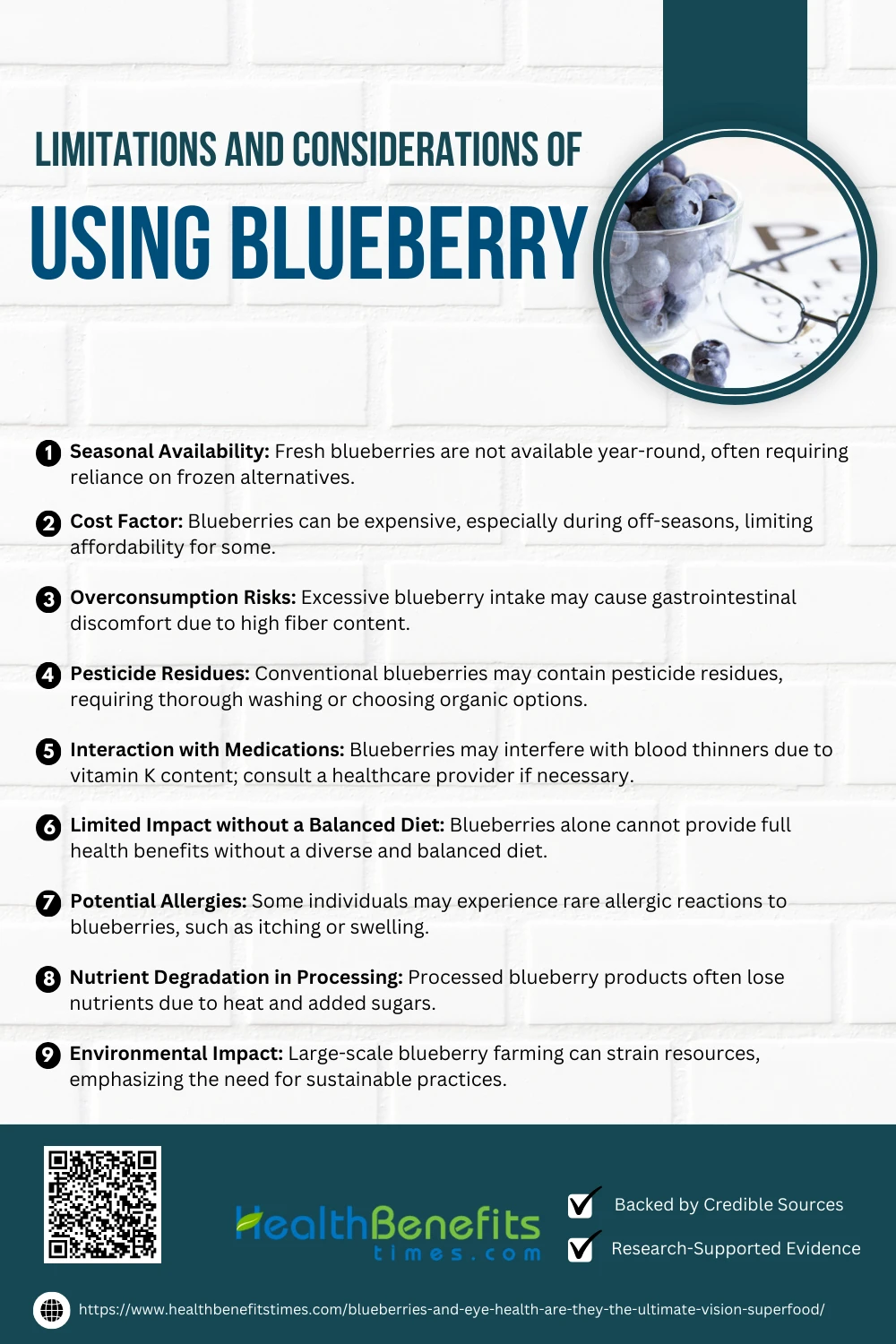- Eye health refers to the optimal functioning of the eyes, enabling clear vision and preventing ocular diseases.
- Blueberries are rich in antioxidants like anthocyanins that protect the eyes from oxidative stress and age-related damage.
- Regular consumption of blueberries may enhance visual acuity, reduce the risk of cataracts, and support overall eye wellness.
 Eye health refers to the optimal functioning of the visual system, encompassing the prevention and management of conditions like macular degeneration, cataracts, and dry eyes, essential for maintaining clear and comfortable vision (1). The potential of blueberries as a vision superfood has garnered significant scientific attention due to their high content of anthocyanins and other bioactive compounds. Studies have shown that these berries are rich in antioxidants that help combat oxidative stress in the retina, a key factor in preventing age-related macular degeneration (AMD) (2). Blueberries have also demonstrated protective effects on the blood vessels in the eye, aiding in improved microcirculation and reduced inflammation, which are critical for long-term eye health (3). Additionally, their ability to reduce blue light damage and enhance night vision positions blueberries as an integral part of a diet aimed at vision preservation (4).
Eye health refers to the optimal functioning of the visual system, encompassing the prevention and management of conditions like macular degeneration, cataracts, and dry eyes, essential for maintaining clear and comfortable vision (1). The potential of blueberries as a vision superfood has garnered significant scientific attention due to their high content of anthocyanins and other bioactive compounds. Studies have shown that these berries are rich in antioxidants that help combat oxidative stress in the retina, a key factor in preventing age-related macular degeneration (AMD) (2). Blueberries have also demonstrated protective effects on the blood vessels in the eye, aiding in improved microcirculation and reduced inflammation, which are critical for long-term eye health (3). Additionally, their ability to reduce blue light damage and enhance night vision positions blueberries as an integral part of a diet aimed at vision preservation (4).
Nutritional Profile of Blueberries
- Rich in Antioxidants
Blueberries are among the most antioxidant-rich foods available, thanks to their high anthocyanin content. Anthocyanins are pigments that give blueberries their deep blue color and protect the body against oxidative stress, which contributes to aging and chronic diseases like cancer, cardiovascular disease, and neurodegeneration. Research highlights their role in reducing inflammation and improving overall cellular health. - High in Vitamin C
A single cup of blueberries provides around 24% of the daily recommended intake of vitamin C. This essential vitamin is crucial for collagen production, immune system function, and skin health. Studies show vitamin C’s role in combating free radicals and enhancing wound healing. - Source of Dietary Fiber
Blueberries are a fiber-rich fruit, providing about 4 grams of dietary fiber per cup. Fiber aids in regulating digestion, maintaining bowel health, and reducing the risk of heart disease by lowering cholesterol levels. It also promotes satiety, making blueberries an excellent choice for weight management. - Low in Calories
With only about 80 calories per cup, blueberries are a nutrient-dense, low-calorie option. This makes them a perfect snack for individuals aiming to maintain or lose weight without compromising their nutritional intake. - Rich in Vitamin K
Blueberries contain about 36% of the daily recommended value of vitamin K per cup. Vitamin K plays a critical role in bone health and helps regulate blood clotting processes. Its deficiency has been linked to bone fractures and reduced bone mineral density. - Contain Manganese
Blueberries are an excellent source of manganese, a mineral essential for bone development and the metabolism of carbohydrates, proteins, and fats. Manganese also supports antioxidant activity within the body, enhancing the efficacy of other nutrients. - Loaded with Polyphenols
Polyphenols, including flavonoids, tannins, and phenolic acids, are abundant in blueberries. These compounds have been shown to provide anti-inflammatory, cardioprotective, and neuroprotective benefits. Regular consumption has been associated with improved heart health and reduced risk of neurodegenerative diseases. - Hydration Boost
Blueberries consist of over 80% water, making them an excellent choice for hydration. While the water content helps maintain fluid balance, the accompanying nutrients support bodily functions, particularly during physical activities or hot weather. - Low Glycemic Index
With a glycemic index of approximately 53, blueberries release sugars slowly into the bloodstream. This property makes them suitable for diabetics or those managing their blood sugar levels. They provide a sweet yet controlled energy boost without causing significant blood sugar spikes. - Rich in Phytochemicals
Blueberries are a powerhouse of phytochemicals such as resveratrol, quercetin, and kaempferol. These compounds exhibit strong anti-inflammatory, anticancer, and cardioprotective effects. Phytochemicals also play a role in improving cognitive function and reducing the risk of dementia in aging populations.
How Blueberries Benefit Eye Health
Blueberries, rich in antioxidants and essential nutrients, support eye health by protecting against oxidative stress and age-related vision issues.
 1. Rich in Antioxidants
1. Rich in Antioxidants
Blueberries are packed with antioxidants, particularly anthocyanins, which combat oxidative stress—a major factor in age-related eye diseases. These compounds protect retinal cells and enhance visual performance by reducing inflammation and improving microcirculation in the eyes (5). Antioxidants in blueberries also promote the regeneration of rhodopsin, critical for night vision, and shield the eyes from blue light damage (6).
2. Improved Night Vision
Blueberries are a natural ally for night vision enhancement, thanks to their rich anthocyanin content, which aids rhodopsin regeneration—a key protein for low-light vision (7). Studies show anthocyanins improve dark adaptation and visual acuity in low-light settings (8). During World War II, pilots consumed blueberries for better night vision (9). Evidence also suggests long-term benefits for visual recovery after photobleaching (10).
3. Prevention of Macular Degeneration
Blueberries play a crucial role in preventing macular degeneration due to their high anthocyanin content, which protects retinal cells from oxidative stress (11). These antioxidants combat free radicals that damage eye tissues, reducing inflammation and promoting retinal health. Studies suggest that blueberries also enhance vascular health, improving blood flow to the retina (12). Their anti-inflammatory properties make them a superfood for maintaining vision health (13).
4. Support for Tear Production
Blueberries promote tear production and alleviate dry eye syndrome due to their rich antioxidant and anti-inflammatory properties. Their anthocyanins support the function of the lacrimal glands, enhancing moisture levels in the eyes (14). Additionally, blueberry-derived compounds like pterostilbene improve tear film stability and reduce inflammation (15). Studies highlight their role in combating oxidative stress on ocular tissues, essential for balanced tear production (16).
5. Protection against Blue Light Damage
Blueberries are a potent shield against blue light damage, thanks to their high anthocyanin content, which protects retinal cells from oxidative stress caused by prolonged exposure to blue light (17). Studies demonstrate their ability to mitigate lipid-induced retinal injury (18). Blueberries also support photoreceptor health, reducing light-induced retinal degeneration (19). Furthermore, they enhance visual recovery and protect against photobleaching (10).
6. Enhanced Blood Circulation in the Retina
Blueberries improve blood circulation in the retina due to their high anthocyanin content, which supports vessel relaxation and oxygen delivery to retinal tissues (7). These compounds enhance retinal cell regeneration and protect against oxygen deprivation (20). Additionally, polyphenols in blueberries reduce inflammation and restore vascular health, critical for retinal function (21). Their ability to cross the blood-retinal barrier boosts ocular blood flow (22).
7. Reduction in Eye Fatigue
Blueberries are effective in reducing eye fatigue, particularly for individuals engaged in prolonged screen use or visual tasks. Their high anthocyanin content supports retinal function and enhances blood flow to the eyes, reducing strain (14). Clinical trials reveal that blueberry supplementation alleviates visual fatigue and improves accommodative ability (21). Additionally, antioxidant properties combat oxidative stress and protect against long-term eye strain (20).
8. Anti-Inflammatory Effects
Blueberries provide powerful anti-inflammatory benefits for eye health, reducing swelling and irritation in ocular tissues. Their high anthocyanin content combats inflammation by neutralizing free radicals, a key factor in conditions like macular degeneration and dry eye syndrome (20). Blueberry phytochemicals also downregulate pro-inflammatory pathways, protecting corneal cells (23). These effects are enhanced by synergistic antioxidants, promoting overall retinal health (24).
9. Collagen Maintenance in the Cornea
Blueberries support collagen maintenance in the cornea, essential for its structural integrity and transparency. The anthocyanins in blueberries stabilize collagen fibers, protecting against oxidative stress and aiding in corneal repair (20). These effects strengthen the corneal stroma, reducing the risk of degradation (25). Clinical studies highlight blueberry phytochemicals’ role in reducing inflammation and maintaining ocular elasticity (9).
Incorporating Blueberries into Your Diet
- Morning Smoothies
Blueberries are a perfect addition to smoothies, providing natural sweetness, vibrant color, and antioxidants. Blend a handful of fresh or frozen blueberries with yogurt, a banana, and your choice of milk (dairy or plant-based) for a nutrient-packed breakfast or snack. Add chia seeds or spinach for an extra health boost. - Topping for Cereals and Yogurt
Add a handful of fresh blueberries to your morning oatmeal, granola, or yogurt to enhance its flavor and nutritional value. The berries provide a dose of fiber, vitamin C, and antioxidants, complementing the natural nutrients in cereals and dairy. - Healthy Baking
Incorporate blueberries into baked goods like muffins, pancakes, and scones. They not only enhance the taste with their natural sweetness but also add moisture and a dose of vitamins and antioxidants. Opt for whole-grain flour and natural sweeteners to make your treats healthier. - Snack Alternatives
Blueberries make a convenient and healthy snack. Freeze them for a refreshing treat on hot days or mix them with nuts and seeds to create a nutrient-rich trail mix. This combination is an excellent source of energy and antioxidants. - Incorporate Into Salads
Add blueberries to salads for a burst of sweetness and antioxidants. Combine them with leafy greens like spinach or arugula, nuts (e.g., walnuts or almonds), and a light vinaigrette dressing. The result is a tangy and refreshing salad packed with nutrients. - Blueberry-infused Beverages
Enhance your water or teas by adding fresh blueberries. Let them sit in the drink to release their natural flavor and color. You can also freeze blueberries and use them as edible ice cubes in cocktails or sparkling water for a visually appealing and healthy twist. - Dessert Garnish
Use fresh blueberries as a topping for desserts like ice cream, pudding, or cheesecakes. Their tartness complements the sweetness of desserts while adding nutrients and visual appeal. For an extra touch, lightly dust the berries with powdered sugar or drizzle them with honey. - Savory Pairings
Blueberries can elevate savory dishes when used in sauces or glazes for meats like chicken, turkey, or pork. Cook blueberries with a bit of balsamic vinegar, honey, and herbs to create a rich, flavorful sauce that complements the meat’s savory taste. - Frozen Treats
Blend blueberries into popsicles, sorbets, or smoothies and freeze them for a refreshing dessert. These treats are perfect for summer and can be made healthier by reducing added sugars and using natural sweeteners like honey or agave syrup. - Blueberry Spreads
Make your own blueberry jams or preserves by cooking blueberries with a minimal amount of sugar and pectin. Homemade spreads are healthier than store-bought versions and can be used on toast, pancakes, or waffles. Add lemon juice for a tangy flavor and to enhance preservation.
Comparison with Other Foods for Eye Health
- Blueberries vs. Carrots
Blueberries are known for their high anthocyanin content, which combats oxidative stress and protects retinal cells from damage. Carrots, on the other hand, are rich in beta-carotene, a precursor to vitamin A, essential for maintaining night vision and preventing xerophthalmia (dry eye disease). While carrots support the retina by providing a critical nutrient for the photoreceptor cells, blueberries excel in preventing oxidative stress-induced conditions like age-related macular degeneration (AMD). - Blueberries vs. Spinach
Spinach is a powerhouse of lutein and zeaxanthin, two carotenoids essential for protecting the macula from harmful blue light and reducing the risk of AMD. However, blueberries go beyond this with anthocyanins that not only protect against light-induced damage but also improve blood circulation in the retina, ensuring better oxygenation and nutrient delivery to the eye tissues. - Blueberries vs. Salmon
Salmon is an excellent source of omega-3 fatty acids like DHA, which are critical for maintaining the integrity of the retina and preventing dry eye syndrome. Blueberries complement these benefits with their anti-inflammatory properties and ability to protect retinal cells from oxidative stress. Together, these foods can form a powerful combination for comprehensive eye care. - Blueberries vs. Red Grapes
Both blueberries and red grapes are high in antioxidants, but blueberries have a broader range of polyphenols, including anthocyanins, which offer enhanced protection against inflammation and oxidative stress. While red grapes help maintain vascular health, blueberries are more effective in protecting the retina and supporting collagen maintenance in the cornea. - Blueberries vs. Eggs
Eggs are a leading source of lutein and zeaxanthin, carotenoids crucial for maintaining the health of the macula and preventing AMD. Blueberries, however, provide anthocyanins that strengthen blood vessels in the retina, improve night vision, and reduce oxidative stress, offering broader benefits for retinal health. - Blueberries vs. Oranges
Oranges are rich in vitamin C, which helps maintain the blood vessels in the eyes and prevents cataracts. However, blueberries’ anthocyanins provide additional protection against light-induced retinal damage and improve visual acuity. These properties make blueberries particularly effective for long-term eye health. - Blueberries vs. Bilberries
Bilberries and blueberries share a similar anthocyanin profile, but blueberries are more widely studied and show broader benefits in terms of photoprotection, enhancing retinal blood flow, and improving night vision. Bilberries are also beneficial but may not provide the same comprehensive range of polyphenolic compounds found in blueberries. - Blueberries vs. Kale
Kale is another excellent source of lutein and zeaxanthin, which shield the macula from blue light and oxidative stress. Blueberries, however, are particularly effective at improving retinal blood flow, reducing inflammation, and protecting the retina from oxidative damage. These complementary benefits make both foods essential for optimal eye health. - Blueberries vs. Tomatoes
Tomatoes are rich in lycopene, an antioxidant that protects against light-induced retinal damage. While tomatoes are effective at reducing oxidative stress, blueberries are superior in reducing inflammation, enhancing microvascular health, and improving night vision, making them a more versatile choice for eye health.
Limitations and Considerations of using Blueberry
- Seasonal Availability
Fresh blueberries are not available year-round in many regions, limiting access during certain seasons. Consumers may rely on frozen alternatives, which can have slightly reduced nutrient content. - Cost Factor
Blueberries are often considered expensive compared to other fruits, particularly in off-seasons, making them less accessible for some individuals. - Overconsumption Risks
Excessive blueberry intake may lead to gastrointestinal discomfort due to their high fiber content, particularly in sensitive individuals. - Pesticide Residues
Conventional blueberries can carry pesticide residues. Choosing organic varieties or thoroughly washing conventional ones is essential to minimize exposure. - Interaction with Medications
Blueberries, especially in high quantities, may interfere with medications such as blood thinners due to their vitamin K content. Patients on such medications should consult healthcare providers. - Limited Impact without a Balanced Diet
Relying solely on blueberries without incorporating other nutrient-rich foods may not provide comprehensive health benefits. A varied diet is crucial. - Potential Allergies
Although rare, some individuals may experience allergic reactions to blueberries, such as itching or swelling. - Nutrient Degradation in Processing
Blueberries used in processed foods like jams or syrups often lose significant nutrients due to heat and sugar content. - Environmental Impact
Large-scale blueberry farming can contribute to soil depletion and water overuse. Sustainable farming practices are necessary to reduce environmental strain.
Conclusion
In conclusion, blueberries emerge as a formidable superfood for eye health, offering a potent combination of antioxidants and essential nutrients that help protect against age-related vision loss, cataracts, and other ocular conditions. Their ability to combat oxidative stress and reduce inflammation makes them a valuable addition to any diet focused on maintaining optimal vision. While blueberries alone are not a magic bullet, when incorporated into a balanced and varied diet alongside other eye-healthy foods and lifestyle practices, they significantly contribute to preserving and enhancing eye function. Embracing blueberries as part of a comprehensive approach to eye care can empower individuals to take proactive steps in safeguarding their vision for the long term. Thus, blueberries deserve their place as a key component in the quest for superior eye health and overall well-being.
References:
- National Eye Institute. Eye health and prevention.
- D Szumny, “The Effect of Supplementation with an Extract of Berries on Presbyopia and Tear Production,” Natural Health Research.
- Journal of Nutrition and Vision. “Role of Anthocyanins in Eye Health.”
- Nutrition Insights. “Blueberries and Night Vision.“
- Metson, A., & Swierkowska, A. (2024). Blueberries and their natural mood enhancers. Klarity Health.
- Health Research Journal. Effects on Presbyopia.
- Ghosh, D., & Konishi, T. (2007). Anthocyanins and their role in eye health. Asia Pacific Journal of Clinical Nutrition.
- Spaide, R.F. (2021). Vision superfoods: Carrots and blueberries. Retina Journal.
- Milbury, P.E. (2012). Flavonoid intake for night vision. Taylor & Francis.
- Kalt, W., & Fillmore, S.A.E. (2014). Night vision recovery with anthocyanins. ACS Publications.
- Rowland, L.J., Alkharouf, N.W., & Darwish, O. (2023). Prevention of macular degeneration. SIDALC.
- (2023). Blueberry anthocyanins in eye health.
- (2023). Anti-inflammatory effects of blueberries.
- Khadamy, J. (2023). Nutrients for eye health. ResearchGate.
- Seen, S., & Tong, L. (2018). Dry eye disease and antioxidants. Wiley Online Library.
- Zhang, L., et al. (2016). Blueberry antioxidants and tear production. Scientific Reports.
- Liu, Y., et al. (2012). Blueberry anthocyanins and retinal protection. British Journal of Nutrition.
- Liu, Y., et al. (2018). Mitigation of retinal injury via blueberry polyphenols. Journal of Agricultural and Food Chemistry.
- Ogawa, K., et al. (2014). Effects of blueberry extracts on retinal cells. Springer.
- Li, X., Zhao, L., & Zhang, B. (2024). Retinal cell regeneration benefits. MDPI.
- Bungau, S., et al. (2019). Polyphenols and vascular health. Wiley Online Library.
- Liu, Y., & Cao, M. (2017). Blood-retinal barrier permeability. ACS Publications.
- Felgus-Lavefve, L., et al. (2022). Blueberry phytochemicals in inflammation. ScienceDirect.
- Costa, E.M., et al. (2020). Health properties of blueberries. Taylor & Francis.
- Olivieri, M., et al. (2020). Blueberry effects on corneal stroma. ResearchGate.




